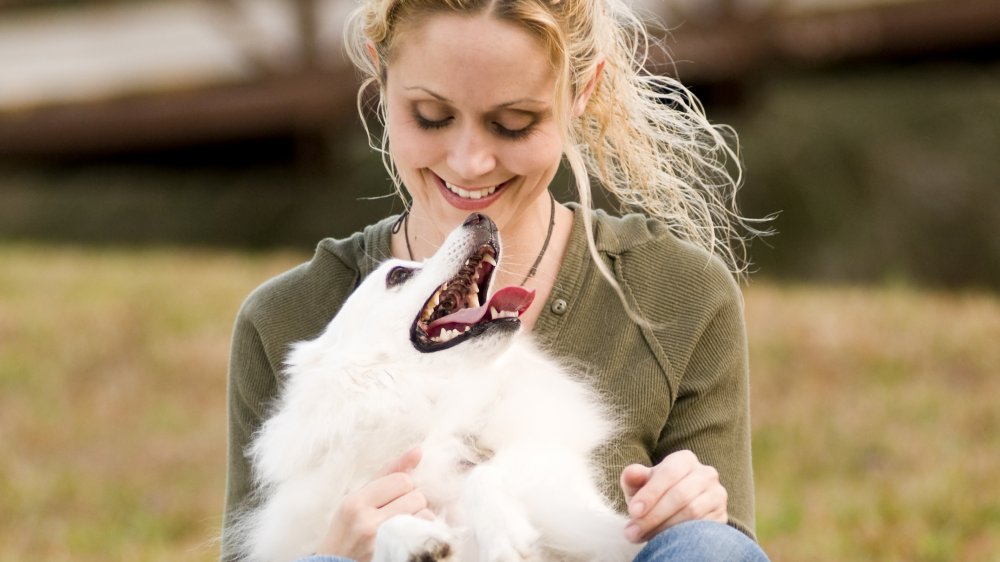Oxytocin: The Truth About The Love Hormone
Oxytocin, known to many as the "love hormone" or "cuddle drug," is something that many people associate with intimacy. Specifically, it is supposed to be the substance that makes you feel all warm and fuzzy after you do the deed, and can lead to feelings that provide the basis for a solid, long-lasting relationship... or something that's not destined to work out so great in the long run. After all, no one ever said hormones were capable of making good decisions.
Oxytocin isn't just a brain chemical that can lead to romantic love, however. It also plays a role in establishing familial bonds, as well as establishing feelings of closeness with friends, pets, and even total strangers. Although some have hailed it as a kind of universal panacea and Translational Psychiatry reports that oxytocin nasal spray has been explored as a treatment for conditions ranging from autism to PTSD (via Nature), oxytocin is not without its darker side. As the British Psychological Society reveals, this "moral molecule" also has the ability to make people act in ways that are anything but loving and caring.
Oxytocin helps form the first bond of all
Oxytocin is well known for promoting the first closeness any of us experience, that being the relationship with our mothers that begins on the day we're born. Progress in Neurobiology calls oxytocin "the great facilitator of life," and says this hormone is essential for stimulating childbirth as well as allowing breastfeeding and causing women to experience maternal feelings towards their children (via NCBI). The mother's behavior toward her baby then affects the child's own development of oxytocin receptors (via Science Daily). In other words, it's essentially it's kind of a chicken-and-egg cycle here. Oxytocin is what allows you to be born, and your mom's own oxytocin levels are also likely to affect how she cares for your infant self. This, in turn, affects your own oxytocin levels which will come into play as you grow up and form social relationships of your own.
Interestingly enough, though, oxytocin doesn't always promote fond memories of Mom in later years. A study reported in the Proceedings of the National Academy of Sciences found that some of the men who were given oxytocin nasal spray reported more negative memories of their mother's parenting while under its influence than they did when administered a placebo instead. These findings seem to parallel a study of mice (via Science Daily) that found higher oxytocin levels seemed to strengthen bad memories. It would seem that oxytocin might not always be so warm and fuzzy after all.
Oxytocin's not just about cuddling
Oxytocin doesn't just affect the kinds of relationships that tend to involve hugging. It can also help you feel warmly towards friends, coworkers, and even, it would seem, people you don't know from Adam. There have been some studies that show this hormone allowing trust relationships to be more easily built, and other studies indicating that it also increases not only empathy, but generosity. Science Daily describes a 2007 experiment in which research subjects were told to make a decision on how they would split a sum of money with a stranger. Those subjects who received a dose of oxytocin prior to making the decision were found to have been willing to give away 80 percent more money than the control group who were not given any of the hormone.
Hmm, good news, you might think, should you be in line for an inheritance from Grandma. Well, not necessarily. Under the influence of the feel-good hormone, Grandma might just choose to give away that priceless family collection of black velvet paintings to some random stranger, or perhaps she'll leave her nest egg to her darling Chiweenie.
Oxytocin bonds people with dogs, too
Actually, choosing to leave an inheritance to a beloved pet may very well be an oxytocin-fueled decision (although one not likely to be approved of by a financial advisor). Not only does petting and playing with a dog raise oxytocin levels in that dog's human, but it appears to work both ways. A 2015 study of canine/human interaction indicated that the longer a dog gazed at their guardian, the higher the dog's levels of oxytocin were (via The Bark). It also showed that administering oxytocin to female dogs would cause them to gaze for even longer periods of time, although this did not have the same effect on male dogs.
Other studies have shown that dogs' oxytocin levels are linked to their degree of social responsiveness, meaning how willing they are to interact with humans. While oxytocin did have some effect on this, the indications are that not all dog breeds experience the same results. For example, artificially boosting oxytocin levels was found to have a greater impact on border collies, a breed that has long worked in close cooperation with humans, than it did on Siberian Huskies, a more wolflike breed as stubbornly independent as it is strikingly beautiful. Still, no matter the breed of your canine companion, one thing seems to be true — the more you interact with each other, the more it will raise oxytocin levels on both sides, and the closer and happier the two (or more) of you will feel.
Oxytocin can make you act like a jerk
Oxytocin is frequently linked to feelings of joy and contentment, yet there are times when it doesn't make you feel so great. Not only might it have the power to strengthen unpleasant memories, but it can increase feelings of fear and anxiety. There's also a downside to the group bonding that oxytocin promotes, as while it strengthens ties to members of what you perceive as your "in group," it can lead to prejudice against those seen as outsiders and even to xenophobia (via Proceedings of the National Academy of Sciences). One experiment published in Biological Psychiatry even showed that subjects given an oxytocin nasal spray before playing a game where money was at stake displayed increased levels of both envy and schadenfreude (via PubMed).
Perhaps the worst aspect of oxytocin is the fact that it can promote aggression. Not only the type that might be seen as justified, like Mama Bear protecting her cubs, but basically going full-on jerk. eLife Sciences reported experimental findings showing that oxytocin bonding amongst group members made them better able to work together to launch coordinated attacks on non-group members, while the British Psychological Society revealed the disturbing truth that some male subjects given oxytocin reported that they felt more likely to engage in violence against a romantic partner. Whoa, what happened to cuddling? It seems oxytocin, as with anything else pertaining to human nature, is way more complex than we once thought.





